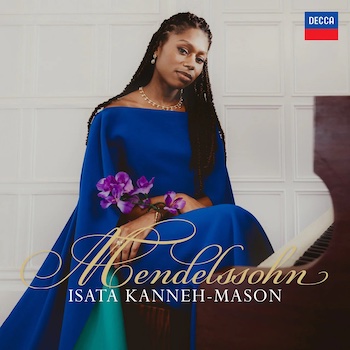Classical Album Reviews: Anna Clyne’s Sumptuous “Shorthand” and Isata Kanneh-Mason’s Intense “Mendelssohn”
By Jonathan Blumhofer
Composer Anna Clyne’s collection of works for mostly solo instruments offers enormous musical satisfaction; pianist Isata Kanneh-Mason knows how to craft an enticing program and advocate for it.

With three months left in 2024 there’s still time, but it’s hard to imagine another new music album coming out this year that offers, on its surface, more sumptuous beauty and, beneath that, musical satisfaction than Anna Clyne’s Shorthand. A collection of works for mostly solo instruments with string orchestra, the recording stands as a testament to the security and originality of Clyne’s voice, which is among the most compelling of the day.
Take the title track, heard in two versions (the concluding REDUX makes for a perfect bookend to the larger album), both featuring Yo-Yo Ma and The Knights. True, this combo could make anything sound amazing. But Clyne’s written something of enchanting, ethereal beauty here, music that balances moments of heartrending, elegiac lyricism with gritty, acidic interruptions.
Three Sisters, a concerto for mandolin and strings, is similarly ghostly, though overall a bit more extroverted. In it, the shadow of Philip Glass never feels too far off, though Clyne’s writing always goes its own way. Most striking is the finale, which seems to imagine how Vivaldi might have channeled flamenco music. Its rapid-fire passagework is all ably navigated by Avi Avital.
The earliest concertante item is Prince of Clouds, for two violins and string orchestra. In some regards, it’s the simplest work on offer here, with a series of ideas being passed among the soloists and between them and the ensemble. While the density of Clyne’s scoring recalls the Baroque concerto grosso genre, Prince’s sectional structure, choppy transitions, and lack of development makes it the least effective selection on the album, despite the advocacy of violinists Pekka Kuusisto and Colin Jacobsen.
No such issues cloud Within Her Arms, though, Clyne’s potent memorial to her mother, who died suddenly in 2008. Hazy, resonant, passing by like a dream, this surging, deeply personal threnody lingers hauntingly in the mind for far longer than its twelve-minute duration suggests it should – and, like most of the rest of this CD, for all the right reasons

There’s no question pianist Isata Kanneh-Mason knows how to craft an enticing program and advocate for it, musically. The focus of Mendelssohn, her fourth solo album for Decca, is the latest demonstration of this ability. Surveying works by two of the 19th century’s greatest musical siblings, Fanny and Felix, with arrangements by composers inspired by the latter, it neatly balances the familiar with the less-known.
The former all come from the pen of Felix, whose Piano Concerto No. 1 is paired with excerpts from both A Midsummer Night’s Dream and the Songs without Words.
In the Concerto, Kanneh-Mason offers an interpretation that is more Beethovenian than Mozartian. There’s a feisty urgency to the outer movements that one doesn’t always encounter in this fare, as well as impressively lean keyboard textures throughout.
However, the pianist’s emphasis on intensity – matched by Jonathan Bloxham and the London Mozart Players robust accompaniments – comes at a cost. The collective’s tone is more insistent than sparkling and their phrasings (especially the orchestra’s in the middle movement) is, at times, frustratingly literal.
Kanneh-Mason navigates the solo fare somewhat better. Her account of Rachmaninoff’s arrangement of the “Scherzo” from Midsummer is lively and stylish, though also a bit too restrained to feel truly impish.
But Moritz Moszkowski’s adaptation of the “Nocturne” from the same is warm and delicate, as is Liszt’s transcription of “Auf Flügeln des Gesanges.” The two movements from the op. 67 collection of Songs (Nos. 2 and 6) are both given strongly idiomatic readings.
A pair of items by Fanny fare similarly well.
Her Notturno in G minor may not be a major work. But it’s flowing and downright beautiful.
More substantial is her Easter Sonata, which Kanneh-Mason recently took on tour. Her performance here is satisfactory in the middle movements – the Allegretto is a shade monochrome – but really comes to life in the outer sections.
The first is lyrical, graceful, and strongly shaped. Meantime, the finale’s nods to Beethoven prove to be only that: Fanny’s muse runs its own course, boisterous, energetic, and fresh. This is an important work by an important composer and it emerges in Kanneh-Mason’s hands with illuminating character.
Jonathan Blumhofer is a composer and violist who has been active in the greater Boston area since 2004. His music has received numerous awards and been performed by various ensembles, including the American Composers Orchestra, Kiev Philharmonic, Camerata Chicago, Xanthos Ensemble, and Juventas New Music Group. Since receiving his doctorate from Boston University in 2010, Jon has taught at Clark University, Worcester Polytechnic Institute, and online for the University of Phoenix, in addition to writing music criticism for the Worcester Telegram & Gazette.
Tagged: "Shorthand", Anna Clyne, Decca, Isata Kanneh-Mason, Mendelssohn
